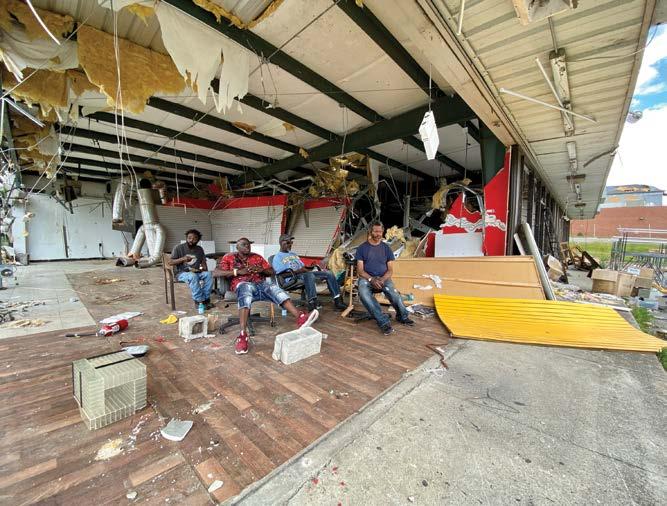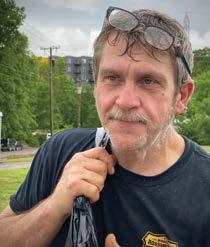
6 minute read
Chaos and Rain: Notes from a homeless pandemic

Four men sit inside an East Nashville building that was damaged during the March 3 tornado. PHOTO BY SUSAN ADCOCK
By Susan Adcock
Paul worked nights at the airport for nearly a year. He loved his job, despite the fact that he also slept there, sitting up in a chair as a lot of travelers do. It was safe and warm and temporary. The way Paul tells it, when word of the coronavirus began to spread, the company he worked for lost their contract and laid off employees. The new company didn’t hire him because he didn’t pass their security test.
He moved to a motel and when his money ran out, to a doorway downtown. Two months later his phone would be turned off.
When we first learned of the novel coronavirus and COVID-19 in early March, there was a learning curve for everyone, with and without housing. Those without housing were often at the mercy of people with internet access. Those who were internet savvy were quickly cut off unless, of course, they had a smartphone. As people became more aware of the danger, more businesses shut down and Nashville cleared out in a way that was visually stunning. The only people left outdoors to speak of were construction workers and those without homes. In time, a new group appeared on the horizon: the newly unemployed.
James regularly made enough money to live in a motel. He was working for Bridgestone as a dishwasher when the pandemic began. When he talks about his job, you can feel the passion he has for getting back to it. He was laid off in early March, moved back to the street, had no access to unemployment and didn’t know where to begin.
When asked why he doesn’t consider moving on he says: “They appreciate me there because I’m a great dishwasher. I work hard. I jump in.”
He knows that Bridgestone will be one of the last places to open, but remains hopeful that he’ll get his old job back. He recently learned that his stimulus check was mailed to an old address. He doesn’t know who lives there now or how to get it back.
The week everything closed, many people living on the street near food and a bathroom were forced to move on. It wasn’t exactly a new experience; they are regularly pushed out, but this time it was citywide.
Restaurants and libraries, government offices and landlords closed their doors. Social workers and mental health professionals (not working at hospitals) went home to adjust to the “new normal” and people without homes stood on the empty streets of Nashville with
what felt like an invisible monster. Food stamps and medication were traded; people were robbed. There were lots of new faces as people looked for resources. It was a deeply exaggerated version of business as usual.
Rodney sent me a message one day, asking for propane and water. When I arrived there was a panic in his eyes I hadn’t seen before.

Rodney
“My Suboxone appointment was canceled, the office is closed,” he said shouting through the downpour of rain. “Don’t they know what’ll happen to me when I run out?”
His appointment was later rescheduled, but Rodney couldn’t keep his phone charged and didn’t get the message for a couple of weeks. In the ensuing days he bought Suboxone on the street. When the supply ran out he got, in his words: “right back on that dope.”
“Stupid,” he said, referring to his habit. “I was doing good too.”
All but the scrappiest nonprofits and food banks closed their doors. People got hungry and called all the numbers in their phone, to see if there was someone who could help. Almost always they got a recording that began, “Due to the novel coronavirus and COVID-19, our agency is practicing an abundance of caution....”
Early on in the stay-at-home order, Inez went to her first radiation treatment as a follow-up to breast cancer surgery. Due to the “abundance of caution” there, she did five weeks of daily radiation treatments completely on her own, while also sleeping on a concrete slab outdoors. Her nurses became her support system. She said no one had ever been as nice to her as they were. In a way, it was a gift because she also got to wash up in their office restroom every afternoon.

Inez
One day she came back to the park from the hospital and Metro Park Police had ordered all of her belongings be hauled away in a trash truck. She lost her blankets, a sleeping bag and a new gym bag, which held her clothes, a new pair of hiking boots, some gifts she’d gotten after surgery (including a new set of colored pencils) and her follow-up medications.
That same week Room In The Inn closed its winter shelter for public safety reasons, and those who’d been attending all winter long suddenly needed a sleeping bag. Hell, everyone needed a sleeping bag. It was mid-March and the rain hadn’t let up. Wet sleeping bags were disposed of and dry ones were stolen. Ponchos were gold.
Behind the scenes, city leaders and state officials scrambled to be in charge. Zoom meetings commenced. The buses kept running but the only human on there with a six-foot clearance was (and still is) the bus driver.
On Thursday, March 12, Billy had a court date for a verbal assault he committed last July. On the way to court, he had a seizure in his outreach worker’s car and ended up at the emergency room instead. His court date was postponed indefinitely, as was his appointment to be removed from the ‘No Trespassing List’ at Metropolitan Development and Housing Agency. Homeless for 35 years, his appeal and thereby his housing, would be stalled for the third time in two years as Nashville began making plans to work from home.

Billy
It could be said that people without housing have already experienced an evolution of loss. In the big picture they’ve managed to get through this; because they’re used to it — being isolated and doing without. They chuckled when the toilet paper ran out. People with housing are generally used to doing as they please.
This last 11 weeks have given them a taste of that loss and how it might feel to go without, permanently. Many of them rose to the challenge. They were spotted doing some wonderful, humanitarian things. They put turkey sandwiches in sack lunches and delivered them in person regularly. They picked up litter in the park and offered an old man a tent out the back of their truck so he could get out of the rain. They handed outreach workers cash money on the street to support the effort to feed people.
As for the un-housed people in this story, their struggle continues, but occasionally a little light gets in.
Rodney’s doctor finally got through and refilled his prescription. He’s back on track but has yet to master the Zoom appointment.
Billy continues to be hopeful about getting an apartment. A friend gifted him a new black hat he’s very proud of and he’s been eleven straight days without going to the hospital.
James found someone to help him track down his stimulus check and file for unemployment.
Paul got his phone turned back on and in a miraculous twist of fate he got his job back at the airport.
And a tiny group of subversive Jesus types executed a plan to raid a city dumpster and successfully rescue Inez’s bag, with all of her things in it — colored pencils and all.
Susan Adcock is an outreach worker for Open Table Nashville, a nonprofit, interfaith community that disrupts cycles of poverty, journeys with the marginalized and provides education about issues of homelessness.





